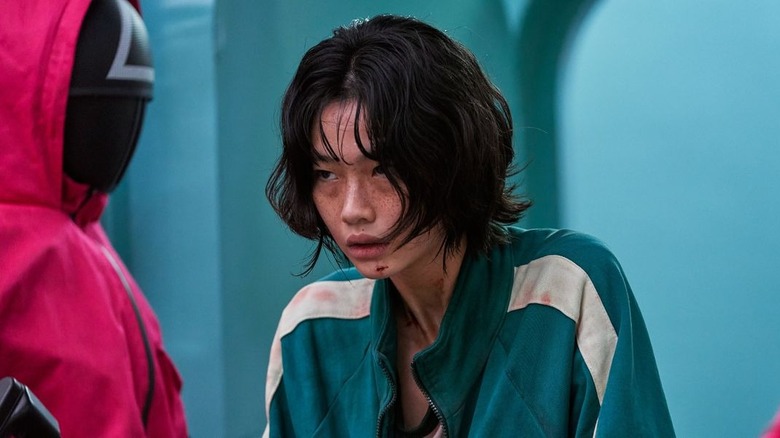Squid Game Might Be Netflix's Biggest Show Ever
Move over, "Tiger King," there's a new weirdo series in town. Hwang Dong-hyuk's Korean survival drama "Squid Game," which has captured the attention of audiences since it dropped on Netflix in mid-September, currently holds the No. 1 slot. The streaming service's co-CEO Ted Sarandos tells Variety that the show could very well become its biggest show ever.
"We did not see that coming, in terms of its global popularity," Sarandos says.
Netflix's second quarter has seen a stagnation in new subscribers, slowing to 1.5 million viewers globally. Following a price hike and a rise in streaming competition from Disney, HBO, and Peacock, a trickle in subscriber flow adds up to a mighty need to provide riveting content for their 209-odd million paid streaming subs.
Your Latest Obsession
Just in time for the Halloween season, "Squid Game" is your latest obsession to binge. Writer-director Hwang Dong-hyuk helms his first series after a string of successful genre-spanning feature films, including the tragic 2011 account of abuse and atrocities at the Gwangju Inhwa School for the deaf, titled "The Crucible." "Squid Game," also titled "Round Six," follows a battle arena structure like "Battle Royale," Takashi Miike's "As The Gods Will," and the odd "Saw" sequel, pitting 456 desperate pawns against each other in an absurdist fight to the death over nine episodes.
Playing schoolyard matches and deadly territory quests like the titular Squid Game, Tug of War, and Red Light, Green Light, the contestants compete for millions in needed prize money; some are like the show's gambling-indebted star Seong Gi-hun (Lee Jung-jae), while others have a different flavor of pressure, like North Korean defector Sae-byeok (Jung Ho-yeon). Others still would simply prefer to control the place and manner of their death, like the terminally ill Oh Il-nam (Oh Yeong-su) who doesn't want to die in the cruel world outside of the competition. The show doesn't focus much on the motivations for joining the games, choosing rather to take the concept to its logical extreme and focus on the power dynamics among the players and the masked hosts, stopping for social commentary along the way.
The simple premise didn't deter Hwang, who tells Variety:
"I wanted to write a story that was an allegory or fable about modern capitalist society, something that depicts an extreme competition, somewhat like the extreme competition of life. But I wanted it to use the kind of characters we've all met in real life."
Egos were built and toppled on the playground, and with "Squid Game's" stakes so much higher than wounded pride or a skinned knee, it's no wonder why viewers are willing to roll the dice and press play.

